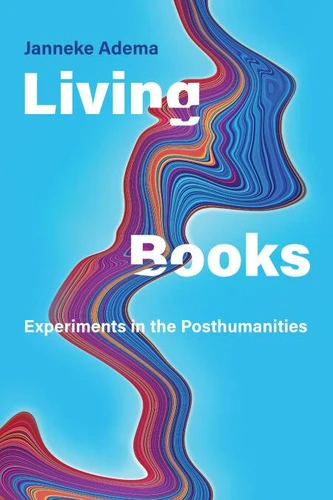Living Books. Experiments in the Posthumanities
Par :Formats :
Disponible dans votre compte client Decitre ou Furet du Nord dès validation de votre commande. Le format ePub protégé est :
- Compatible avec une lecture sur My Vivlio (smartphone, tablette, ordinateur)
- Compatible avec une lecture sur liseuses Vivlio
- Pour les liseuses autres que Vivlio, vous devez utiliser le logiciel Adobe Digital Edition. Non compatible avec la lecture sur les liseuses Kindle, Remarkable et Sony
- Non compatible avec un achat hors France métropolitaine
 , qui est-ce ?
, qui est-ce ?Notre partenaire de plateforme de lecture numérique où vous retrouverez l'ensemble de vos ebooks gratuitement
Pour en savoir plus sur nos ebooks, consultez notre aide en ligne ici
- Nombre de pages350
- FormatePub
- ISBN978-0-262-36645-8
- EAN9780262366458
- Date de parution31/08/2021
- Protection num.Adobe DRM
- Taille3 Mo
- Infos supplémentairesepub
- ÉditeurThe MIT Press
Résumé
Reimagining the scholarly book as living and collaborative--not as commodified and essentialized, but in all its dynamic materiality. In this book, Janneke Adema proposes that we reimagine the scholarly book as a living and collaborative project--not as linear, bound, and fixed, but as fluid, remixed, and liquid, a space for experimentation. She presents a series of cutting-edge experiments in arts and humanities book publishing, showcasing the radical new forms that book-based scholarly work might take in the digital age.
Adema's proposed alternative futures for the scholarly book go beyond such print-based assumptions as fixity, stability, the single author, originality, and copyright, reaching instead for a dynamic and emergent materiality. Adema suggests ways to unbind the book, describing experiments in scholarly book publishing with new forms of anonymous collaborative authorship, radical open access publishing, and processual, living, and remixed publications, among other practices.
She doesn't cast digital as the solution and print as the problem; the problem in scholarly publishing, she argues, is not print itself, but the way print has been commodified and essentialized. Adema explores alternative, more ethical models of authorship; constructs an alternative genealogy of openness; and examines opportunities for intervention in current cultures of knowledge production. Finally, asking why it is that we cut and bind our research together at all, she examines two book publishing projects that experiment with remix and reuse and try to rethink and reperform the book-apparatus by taking responsibility for the cuts they make.
Adema's proposed alternative futures for the scholarly book go beyond such print-based assumptions as fixity, stability, the single author, originality, and copyright, reaching instead for a dynamic and emergent materiality. Adema suggests ways to unbind the book, describing experiments in scholarly book publishing with new forms of anonymous collaborative authorship, radical open access publishing, and processual, living, and remixed publications, among other practices.
She doesn't cast digital as the solution and print as the problem; the problem in scholarly publishing, she argues, is not print itself, but the way print has been commodified and essentialized. Adema explores alternative, more ethical models of authorship; constructs an alternative genealogy of openness; and examines opportunities for intervention in current cultures of knowledge production. Finally, asking why it is that we cut and bind our research together at all, she examines two book publishing projects that experiment with remix and reuse and try to rethink and reperform the book-apparatus by taking responsibility for the cuts they make.
Reimagining the scholarly book as living and collaborative--not as commodified and essentialized, but in all its dynamic materiality. In this book, Janneke Adema proposes that we reimagine the scholarly book as a living and collaborative project--not as linear, bound, and fixed, but as fluid, remixed, and liquid, a space for experimentation. She presents a series of cutting-edge experiments in arts and humanities book publishing, showcasing the radical new forms that book-based scholarly work might take in the digital age.
Adema's proposed alternative futures for the scholarly book go beyond such print-based assumptions as fixity, stability, the single author, originality, and copyright, reaching instead for a dynamic and emergent materiality. Adema suggests ways to unbind the book, describing experiments in scholarly book publishing with new forms of anonymous collaborative authorship, radical open access publishing, and processual, living, and remixed publications, among other practices.
She doesn't cast digital as the solution and print as the problem; the problem in scholarly publishing, she argues, is not print itself, but the way print has been commodified and essentialized. Adema explores alternative, more ethical models of authorship; constructs an alternative genealogy of openness; and examines opportunities for intervention in current cultures of knowledge production. Finally, asking why it is that we cut and bind our research together at all, she examines two book publishing projects that experiment with remix and reuse and try to rethink and reperform the book-apparatus by taking responsibility for the cuts they make.
Adema's proposed alternative futures for the scholarly book go beyond such print-based assumptions as fixity, stability, the single author, originality, and copyright, reaching instead for a dynamic and emergent materiality. Adema suggests ways to unbind the book, describing experiments in scholarly book publishing with new forms of anonymous collaborative authorship, radical open access publishing, and processual, living, and remixed publications, among other practices.
She doesn't cast digital as the solution and print as the problem; the problem in scholarly publishing, she argues, is not print itself, but the way print has been commodified and essentialized. Adema explores alternative, more ethical models of authorship; constructs an alternative genealogy of openness; and examines opportunities for intervention in current cultures of knowledge production. Finally, asking why it is that we cut and bind our research together at all, she examines two book publishing projects that experiment with remix and reuse and try to rethink and reperform the book-apparatus by taking responsibility for the cuts they make.



